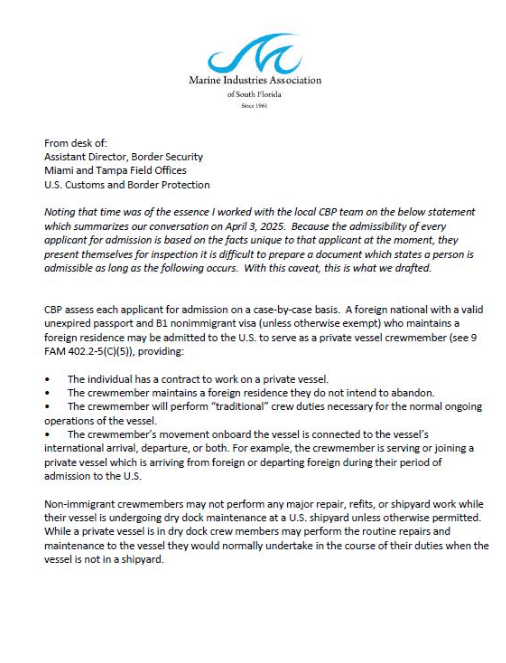
Navigating the complexities of U.S. customs and immigration regulations
can be challenging, especially for foreign nationals seeking to work as crewmembers on vessels. The U.S. Customs and Border Protection (CBP) has established specific guidelines for assessing applications from foreign crew, emphasizing the need for compliance with various regulations. This blog will explore the key requirements for vessels and their crews, along with the potential consequences of non-compliance.
Case-by-Case Assessment by CBP
When foreign nationals apply for admission to the U.S. as vessel crewmembers, CBP evaluates each application on a case-by-case basis. The applicant must possess a valid unexpired passport and a B1 nonimmigrant visa, which is essential for individuals traveling to the U.S. for business-related purposes, including work on a vessel.
The assessment process considers several factors, including the applicant’s intent to work on a specific vessel and adherence to the requirements set forth in immigration regulations. This thorough evaluation aims to ensure that only qualified individuals enter the U.S. to fulfill specific roles aboard vessels.
Vessel Requirements
To qualify for foreign crewmember admission, the vessel itself must meet certain criteria:
- Regulatory Compliance: The vessel must adhere to all applicable U.S. maritime safety, environmental, and operational regulations. This includes maintaining necessary documentation and certifications, which are essential for the vessel’s legal operation.
- Operational Status: The vessel should be actively engaged in maritime operations, such as commercial fishing, passenger transport, or cargo shipping. This operational status confirms that the vessel serves a legitimate business purpose.
- Crew Duties: Crewmembers must be involved in tasks directly related to the vessel’s operations. This requirement ensures that their work aligns with the vessel’s purpose while in U.S. waters.
- Proper Documentation: Maintaining proper documentation, including crew lists and proof of employment, is essential to validate the crew’s affiliation with the vessel. This documentation serves as evidence of compliance with immigration regulations.
Consequences of Non-Compliance
Failing to comply with U.S. regulations regarding foreign vessel crewmembers can lead to significant penalties. These can include:
- Denial of Entry: Foreign nationals may be denied entry into the U.S. if they do not meet the necessary requirements or if their vessel is found to be non-compliant.
- Fines: Vessels and their operators can face substantial fines for violating immigration and customs laws. This includes issues related to crew documentation and vessel registration.
- Detention of Vessels: Non-compliant vessels may be detained by CBP or other relevant authorities until all compliance issues are resolved. This detention can disrupt operational schedules and lead to financial losses.
- Legal Action: Continued non-compliance can result in legal actions against the vessel’s owner or operator, which may include civil or criminal penalties, further complicating the situation.
- Impact on Future Admissions: Non-compliance can adversely affect the ability of the vessel and its crew to gain future entry into U.S. waters, potentially jeopardizing business operations and relationships.
Conclusion
Understanding the U.S. entry requirements for foreign vessel crewmembers is essential for ensuring compliance and avoiding potential penalties. CBP’s case-by-case assessment process, combined with specific vessel requirements, highlights the importance of adhering to regulations. By ensuring that vessels are properly registered and compliant with U.S. laws, and that crewmembers fulfill their designated roles, stakeholders can navigate the complexities of maritime operations more effectively.
For vessel operators and crewmembers alike, being informed about these guidelines can not only streamline the entry process but also contribute to a smoother and more successful maritime experience in U.S. waters.


